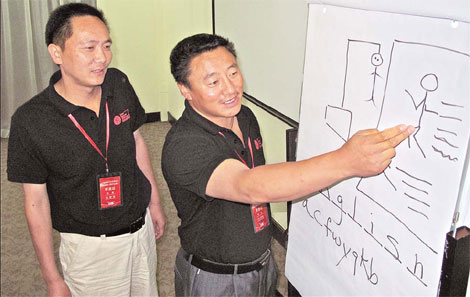Teaching the teachers
Rural school headmasters, used to smacking to discipline children and whitewashing the truth during inspections, learn of better ways to manage their charges, at a just-concluded program in Beijing.
 |
|
Two headmasters disscussing what they just learned during the Global Leadership Fellowship for Principals in Mountainous Regions of China program. |
Li Jun wants to stop beating the children.
Wang Yaorong wants a school building that's better than a "toilet".
And Luosong Jiangcuo just hopes for a building, since the Yushu quake destroyed the brick schoolhouse in Qinghai province's Yege village.
They all hoped to discover solutions to the problems they face as headmasters of schools in some of China's poorest rural areas during the weeklong Global Leadership Fellowship for Principals in Mountainous Regions of China program, which concluded in Beijing on Saturday.
The training sessions may have brought together the largest-ever number of headmasters from impoverished countryside schools, organizers of Low-Income Visionary Education (LIVE) says. The 15 principals from Anhui, Sichuan, Yunnan, Qinghai and Gansu provinces took courses taught by China's leading experts in education, fine arts, science, environmental protection and psychology. Candidates were selected based on their passion for education, academic proficiencies and administrative experience, LIVE deputy executive director Chen Yanhong says.
"Since they are from such remote places, it's rare for them to enjoy such eye-opening opportunities," Chen says.
"They all said that before the courses, they felt like globalization was something very far from them. But now they know it's not."
And the headmasters say they have benefited not only from face-to-face interactions with top thinkers in their fields but also from getting the chance to speak with one another about the often-shared problems their schools face.
Wang, who is headmaster of the middle school in Anhui's Lingbi county and its three surrounding villages, says the suggestions he received from an administrator from rural Sichuan might prove useful in improving students' performance. "Before, we would beat them when they would make mistakes," he says. "But now I realize there are better ways to deal with them. But it'll be hard to change, because we have done it that way for so long."
Such disciplinary measures are commonplace in countryside classrooms.
Luosong Jiangcuo, from Yushu's Yege village, says the training helped him realize that teachers should not hit the students yet also voices similar concerns about halting the practice.
He explains that academic and discipline problems have increased since the quake destroyed their school and pushed the 130 students in grades 1 through 3 into a tent.
"I can't promise we can do it, because some students are so hard to teach," he says. "But we'll try."
Luosong Jiangcuo says he also learned from the other principals that he needs to be more assertive to improve conditions at his school.
"I'm shy and never realized that was a problem," he says.
But now, he understands he needs to push local officials to get electricity in the school, which would cost 8,000 yuan ($1,179), he says. Even before the quake, there was no power in the village.
And talking to principals from Sichuan helped Luosong Jiangcuo realize he should present an honest, rather than a spruced up, school for government inspections, he explains.
"The best approach is showing them the truth. That is the only way they can help," he says.
"That way, the conditions will get better, and we won't need to make things look good for the officials, because they will actually be good."
It's a method Wang says he also plans to use. He explains that the teaching environment is the school's biggest problem.
"Our school could fall apart any day now," he says. "Our chairs and desks are already broken."
Half of the 200 students must live in one of the classrooms, because their homes are too far away for them to return daily, Wang explains.
This creates a lack of classroom space, meaning three grades sometimes must take different courses simultaneously in the same room. Every grade learns from a different teacher while seated facing different directions from the other grades.
"It's very crowded. It exhausts our teachers, but they still do the best they can," he says.
Despite their willingness, most instructors in Lingbi are insufficiently qualified. Some have not studied past primary school and none has attended university.
"Some teachers don't even know what a computer is," Wang says. "They lack knowledge and have nowhere to turn if they can't answer students' questions."
Nine of them are older than 50, he says. Young people aren't willing to stay in the village, because they could earn more doing migrant labor in cities.
Li, the primary and middle school administrator in Sichuan's Bazhong prefecture, says the 545-yuan monthly salary does not attract qualified candidates.
Half of the teachers in Bazhong's combined primary and middle school, and its seven village schools are temporary faculty. A single instructor teaches all subjects to the five to 20 primary school students in the prefecture's countryside settlements.
"This kind of situation puts a lot of pressure on the administration," he says. But, like the other training program participants, he says he feels new optimism about the future.
Teachers will send progress reports back to LIVE after returning to their rural schools, Chen says.
"I have new hope that some of the ideas we have acquired from the training will help us improve our education conditions," Wang says.
 0
0 







Go to Forum >>0 Comments